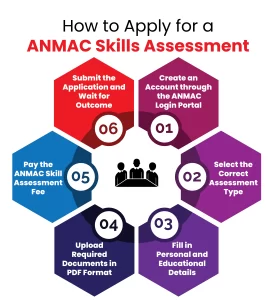Hey, are you an overseas nurse and already got your nursing license through AHPRA?! If you’re planning to start your nursing career in Australia, one of the first things you’ll need to do is the ANMAC Skill Assessment. It’s a key step in the process! This assessment will validates your qualifications, skills, and experience to make sure you meet the standards required for nursing in Australia. Let’s take a closer look at ANMAC Skill Assessment and its procedures.
Table Of Content
1What is ANMAC Skill Assessment2Types of ANMAC Skill Assessment3ANMAC Assessed Nursing Occupation List for Australia Migration4ANMAC Requirements For Overseas Nurses5How to Apply for a ANMAC Skills Assessment6ANMAC Skill Assessment Fee7ANMAC Skill Assessment Processing Time8Frequently Asked Questions
What is ANMAC Skill Assessment
The Australian Nursing and Midwifery Accreditation Council (ANMAC) is the authorized assessing body for internationally qualified nurses and midwives who wish to migrate to Australia. ANMAC evaluates your qualifications, English language proficiency, professional references, and employment history to determine if you meet Australian standards.
A positive ANMAC Skill Assessment is very much important for applying under the General Skilled Migration (GSM) program or securing nursing jobs in Australia. Keep in mind that ANMAC is not the same as AHPRA (which registers nurses to practice in Australia). ANMAC is for migration, AHPRA is for work.
Types of ANMAC Skill Assessment
The Australian Nursing and Midwifery Accreditation Council (ANMAC) offers three different types of skill assessments for overseas nurses and midwives who want to migrate to Australia: Full Skills Assessment, Modified Skills Assessment, and Modified PLUS Skills Assessment.
Each one is designed to match your personal situation like whether you’re already registered with the Australian Health Practitioner Regulation Agency (AHPRA), just starting out, or somewhere in between. The type of assessment you need depends on your qualifications, work experience, and whether or not you already hold registration to practice in Australia.
The three main pathways are:
Full Skills Assessment
This is the right choice for nurses and midwives who are not yet registered with AHPRA. You must provide evidence of your English language test, nursing qualifications, and work experience. It’s commonly chosen by applicants who are still in the process of working toward AHPRA registration but want to start their migration application.
Modified Skills Assessment
This pathway is for nurses or midwives who are already registered with AHPRA (the Australian Health Practitioner Regulation Agency). Since your English skills have already been verified by AHPRA, there’s no need to submit separate English test results. It’s the quickest and easiest assessment route if you’re already fully registered to practice in Australia.
Modified PLUS Skills Assessment
Designed for applicants who have received in-principle approval from AHPRA but are not yet fully registered. You’ll need to submit proof of English proficiency (like IELTS or OET) even if AHPRA has given preliminary approval. This option gives you a complete assessment report that supports both your registration and migration process.
In Short:
- If you’re not yet registered with AHPRA, you’ll likely go through the Full Skills Assessment.
- If you’re already AHPRA-registered, the Modified Assessment is the quickest and most straightforward.
- And if you’re registered but still need a full skills assessment report for migration purposes, the Modified PLUS pathway is for you.
There is also another pathway called Direct care skill assessment. The “Direct Care” pathway used to be a separate stream for aged care or disability support workers (often non-nurses). However, it is no longer listed as a separate core pathway on ANMAC’s main site for internationally qualified nurses.
If you’re a personal care worker or support worker (not a nurse), your assessment may fall under a different migration occupation and authority, not under this Australian skill assessment.
Understanding which assessment applies to you is the first important step in your journey toward living and working as a nurse or midwife in Australia.
ANMAC Assessed Nursing Occupation List for Australia Migration
ANMAC (Australian Nursing and Midwifery Accreditation Council) is the official body that assesses nursing and midwifery qualifications for those applying for skilled migration to Australia.
They assess a wide variety of nursing roles, including those listed under the Australian and New Zealand Standard Classification of Occupations (ANZSCO). This includes not just Registered Nurse in Australia but also Midwives and Enrolled Nurses, across different areas of specialization.
So, whether you’re a general nurse, mental health nurse, surgical nurse, or midwife, ANMAC helps determine if your skills meet Australia’s standards for migration.
Key ANMAC Skill Assessment – Assessed Nursing Occupations (with ANZSCO Codes):
- 134212 – Nursing Clinical Director
- 254111 – Midwife
- 254211 – Nurse Educator
- 254212 – Nurse Researcher
- 254311 – Nurse Manager
- 254411 – Nurse Practitioner
- 254412 – Registered Nurse (Aged Care)
- 254413 – Registered Nurse (Child and Family Health)
- 254414 – Registered Nurse (Community Health)
- 254415 – Registered Nurse (Critical Care and Emergency)
- 254416 – Registered Nurse (Developmental Disability)
- 254417 – Registered Nurse (Disability and Rehabilitation)
- 254418 – Registered Nurse (Medical)
- 254421 – Registered Nurse (Medical Practice)
- 254422 – Registered Nurse (Mental Health)
- 254423 – Registered Nurse (Perioperative)
- 254424 – Registered Nurse (Surgical)
- 254425 – Registered Nurse (Paediatrics)
- 254499 – Registered Nurse (Not Elsewhere Classified)
- 411411 – Enrolled Nurse
These roles are in demand, opening doors to permanent residency and long-term nursing jobs in Australia.
ANMAC Requirements for Overseas Nurses
ANMAC offers three assessment pathways are Modified, Modified PLUS, and Full each designed for different levels of nursing registration and experience. The requirements vary depending on the pathway you are eligible for, including differences in documentation, English language proficiency, and registration status with Ahpra (Australian Health Practitioner Regulation Agency). Choosing the right pathway is a very important step to make sure a smooth and successful assessment process.
To qualify for a positive assessment, you must meet the following ANMAC requirements:
1. Modified Pathway Key Requirements:
Proof of Identity: Passport bio page + government-issued photo ID + passport-style photo.
Ahpra Registration: Upload your current Australian registration certificate.
Qualifications: Degree/diploma certificate and full academic transcript.
Employment Evidence (optional): Only if you’re claiming migration points for skilled work (submit detailed reference letters).
English Test: Not required.
2. Modified PLUS Pathway Key Requirements:
Everything required in the Modified Pathway, plus: A copy of your NOIP letter from Ahpra.
English Test: Not required
3. Full Pathway Key Requirements:
Proof of Identity: Passport bio page, second government photo ID, passport-style photo, name change certificate (if applicable).
English Language Proficiency:
Submit valid test results (≤2 years old) from one of the following:
- IELTS Academic: 7.0 in each band
- OET: Grade B in each component
- TOEFL iBT: 94 overall
- PTE Academic: 65 overall
- Cambridge C1 Advanced: 185 overall
Qualifications: Degree/diploma certificate + full academic transcripts.
Registration Verifications:Verification from all nursing boards where you’ve held registration/licensure.
Professional Reference Letter:If you’re claiming work experience for migration points: must show at least 3 months (or 494 hours) of paid nursing work, signed by a supervisor, with role details and duties.
English Translation (if needed): Must be done by a NAATI-accredited translator.
You should also consult the official ANMAC skill assessment checklist to ensure your application is complete.
How to Apply for a ANMAC Skills Assessment
To apply for an ANMAC skills assessment and choose the assessment type, you must first create an online account on the official ANMAC portal. Then, complete the application form, upload all required documents, and pay the application fee. Make sure your documents such as proof of identity, qualifications, and employment references are accurate, up to date, and meet ANMAC’s specified quality standards.

Here’s a detailed breakdown:
1. Choose Your Assessment Type
Choose your assessment type from the three main types available:
Modified Skills Assessment – for those already registered with AHPRA (Australia) or NCNZ/MCNZ (NZ).
Modified PLUS Skills Assessment – for those with a “Notice of in‑principle approval” from AHPRA.
Full Skills Assessment – for overseas-registered nurses from CAN/US/UK/IE/HK.
2. Check Eligibility
Modified: Must be registered currently with AHPRA, NCNZ, or MCNZ.
Full: Must hold a relevant Bachelor degree and registration in one of the specified overseas countries.
3. Gather Required Documents
Core Documents (all pathways):
- Passport biodata page plus recent photo (≤ 6 months)
- Qualifications & transcripts showing dates
- Registration proof (ANMAC gets AHPRA verification directly; overseas requires “good standing” letters)
- Professional references (from supervisor or manager) with hours/dates. At least 3 months/494 hours paid experience
- Migration Agent Declaration (if using one)
- Payment ready (card on hand).
Full assessment only: English test results (IELTS, OET, TOEFL, PTE, Cambridge).
4. Create ANMAC Portal Account & Apply
- Register for a new account on the ANMAC Skilled Migrant Application Portal.
- Select your assessment type and complete the application form.
- Upload all documents in high-quality format (600 dpi, color, PDF/JPG).
- Pay the fee and note the reference number sent to you via email.
5. Upload Additional Documents
If requested, ANMAC may require:
- Overseas registration proof emailed by the authority to verification@anmac.org.au
- Or posted to their Canberra office.
6. Sit Back & Wait
Processing generally takes 6–8 weeks, although some sources suggest up to 12 weeks.
You’ll be notified via email and can also check your portal dashboard. If further documents are needed, ANMAC will request them.
7. Receive Outcome Letter
Once successful, you’ll receive an outcome letter valid for 2 years, including your recognized qualifications, work experience, and nominated ANZSCO code.
Make sure you include all ANMAC skill assessment documents to avoid delays.
ANMAC Skill Assessment Fee
The ANMAC skill assessment fee varies based on the assessment type:
- Full Skills Assessment: AUD $545
- Modified Skills Assessment: AUD $395
- Modified PLUS: AUD $395
In addition to this Australian Skill Assessment the application fee, there is a non-refundable administration fee of AUD $60. If you need to update your outcome letter or request an internal review (appeal), additional fees of AUD $145 and AUD $300 may apply, respectively. Payments must be made online using a Visa or MasterCard at the start of the application process.
Prices are subject to change, so always check the latest fee on the official ANMAC australia website.
ANMAC Skill Assessment Processing Time
The ANMAC skill assessment processing time depends on the assessment type and document completeness:
- Full Assessment: 6-8 weeks
- Modified/Modified PLUS: 6–8 weeks
However, external sources report longer timelines, typically 6–10 weeks, and during peak periods (e.g., graduation season), processing can extend to 12–16 weeks. Delays may occur if supporting documents are missing or need verification. In real-world cases shared online, wait times have varied: some candidates received results in as quickly as 4–6 weeks, while others waited 10 weeks or more.






I wanna know the requirements for EN assessment for international diploma nurses
Hi Zeitun Adan,
Thank you for reaching out to CanApprove!
We’re glad you took the first step toward your migration journey. For personalized guidance book a free consultation now